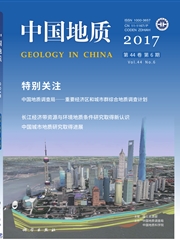

 中文摘要:
中文摘要:
为了使北京西山地质学方面的研究更为全面,并为其他地区寒武系的研究提供对比,以北京西山地区出露的寒武纪地层为根据.进行了层序地层学和沉积学方面的研究。该区寒武纪地层多为碳酸盐岩.岩石类型以各种灰岩及白云岩为主。按照层序地层学的原理和工作方法,结合区域层序界面特征把该区寒武系划为16个三级层序,其中SQ1-SQ3为Ⅰ型层序,Ⅱ型层序则较为发育,SQ4-SQ16都为Ⅱ型层序。研究区寒武系属于典型的碳酸盐岩台地沉积。由于寒武纪研究区内地形地势平缓.构造沉降比较稳定.因而深切谷等标志不发育,所有层序都缺失低水位体系域(LST)或陆架边缘体系域(SMST)沉积。
 英文摘要:
英文摘要:
For the purpose of obtaining more comprehensive geological knowledge and providing contrast to other areas, the authors studied the Cambrian strata exposed in the Western Hill area in the aspects of sequence stratigraphy and sedimentology. In the Western Hills, Cambrian strata are composed of many carbonate rock types comprising various kinds of limestone and dolomite. In accordance with the principles of sequence stratigraphy and the working methods, combined with sequence characteristics of interfaces between the Cambrian strata, the authors defined sixteen major third-order depositional sequences: SQ1-SQ3 for type Ⅰ and much more (SQ4- SQ16) for type Ⅱ. The Cambrian sedimentary strata in this area are typical sediments of stable platform. As Cambrian strata were deposited in the littoral area characterized by gentle topography and stable tectonic subsidence, deep valleys and other deep-cut phenomena are not very obvious, and deposits of lowstand system tracts (LST) or shelf marginal system tracts (SMST) are not found in all sequences.
 同期刊论文项目
同期刊论文项目
 同项目期刊论文
同项目期刊论文
 期刊信息
期刊信息
